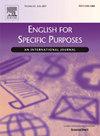Investigating students’ academic language-related challenges and their interplay with English proficiency and self-efficacy on EMI success in Transnational Education (TNE) programs in China
IF 2.7
1区 文学
Q1 LINGUISTICS
引用次数: 0
Abstract
This article reports a quantitative study that investigates students' academic language-related challenges in the context of English Medium Instruction (EMI) in Transnational Education (TNE) programs at a Chinese public university. The study examines the predictive impacts of students' reported linguistic challenges, general English proficiency, and self-efficacy on their EMI success. Descriptive statistical analyses of data collected from 316 Chinese undergraduate students in two TNE engineering programs (Chemical and Electrical) show that students experience considerable language-related difficulties across each academic English skill, with speaking and listening found to be the most challenging in their EMI classes. Further statistical analyses using Pearson's correlation and Structural Equation Modelling (SEM) verify that both students' self-efficacy beliefs and general English proficiency can positively predict their academic success. Moreover, it was found that the students' reported language challenges indirectly predicted their EMI academic success through the direct effect on self-efficacy. These findings highlight two critical pedagogical implications for EMI in Chinese TNE settings: (1) continuous and collaborative ESP courses, with a particular focus on enhancing students' communicative competence, are highly necessary; and (2) the inclusion of local bilingual teaching assistants is recommended to support students' self-efficacy and enhance academic engagement by bridging linguistic gaps.
调查中国跨国教育项目中学生的学术语言相关挑战及其与英语水平和自我效能感在EMI成功中的相互作用
本文报告了一项定量研究,调查了一所中国公立大学在跨国教育(TNE)项目中英语媒介教学(EMI)背景下学生的学术语言相关挑战。该研究考察了学生报告的语言挑战、一般英语水平和自我效能对他们EMI成功的预测影响。从两个TNE工程专业(化学和电气)的316名中国本科生收集的数据的描述性统计分析表明,学生在每项学术英语技能中都遇到了相当大的语言相关困难,其中口语和听力被发现是EMI课程中最具挑战性的。进一步的统计分析使用Pearson’s correlation和结构方程模型(SEM)验证了学生的自我效能感信念和一般英语水平都可以正向预测他们的学业成功。此外,我们还发现学生报告的语言挑战通过对自我效能感的直接影响间接预测了他们的EMI学业成功。这些发现强调了中国TNE环境下EMI教学的两个重要意义:(1)持续和协作的ESP课程,特别注重提高学生的交际能力,是非常必要的;(2)建议加入本地双语助教,通过弥合语言差距来支持学生的自我效能感和提高学术参与度。
本文章由计算机程序翻译,如有差异,请以英文原文为准。
求助全文
约1分钟内获得全文
求助全文
来源期刊

English for Specific Purposes
LINGUISTICS-
CiteScore
5.70
自引率
8.00%
发文量
41
审稿时长
62 days
期刊介绍:
English For Specific Purposes is an international peer-reviewed journal that welcomes submissions from across the world. Authors are encouraged to submit articles and research/discussion notes on topics relevant to the teaching and learning of discourse for specific communities: academic, occupational, or otherwise specialized. Topics such as the following may be treated from the perspective of English for specific purposes: second language acquisition in specialized contexts, needs assessment, curriculum development and evaluation, materials preparation, discourse analysis, descriptions of specialized varieties of English.
 求助内容:
求助内容: 应助结果提醒方式:
应助结果提醒方式:


